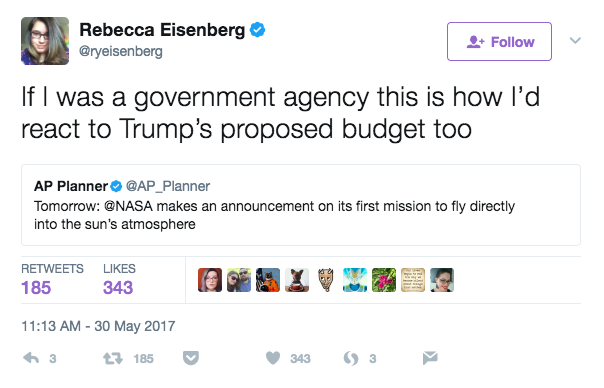Experts Agree That the White House Budget Will Hamper Civil Rights Efforts
By:
As more experts and media outlets analyze President Trump's proposed budget, a noticeable trend has emerged among all of the cuts: reduced funding for civil rights programs.
The Washington Post calls it a federal-wide effort "to rein in government programs that promote civil rights."
 Twitter.com
Twitter.com
The White House has claimed the effort is a "Taxpayer First Budget," which features a host of reforms to welfare, regulations, government spending, and taxes that ultimately "will provide opportunities for economic growth and creation."
Advocates for minorities and low-income Americans see it differently.
Calling the budget "insidious," NAACP Chairman Leon W. Russell released a statement saying it "purposely [refuses] to adequately fund civil rights positions necessary to protect individuals from voter suppression, job discrimination or police brutality."
The left-leaning public policy research firm Center for American Progress had a similarly critical stance on the civil rights cuts in the budget, saying "the Trump budget’s severe cuts to civil rights enforcement would limit recourse for American families who are treated unfairly—by employers, schools, landlords, and lenders—or whose voting rights are curtailed."
Vanita Gupta, who ran the Department of Justice’s Civil Rights Division for several years under President Obama, told the Washington Post that while Trump and his staff might deem the budget a correction of federal overspending, "there’s little question that it’s a rollback of civil rights across the board."
It's Gupta's former department that will take one of the biggest hits under the Trump budget, as the DOJ plans to cut 121 Civil Rights Division employees and over a dozen attorneys, according to its publicly available funding request.
Trump is also planning significant staff cuts to the Department of Education's Office of Civil Rights.
The office investigates harassment and discrimination claims in school districts and public universities around the country, but has struggled in recent years to satisfactorily close cases. Much of this is due to a a 75 percent increase in pending complaints between 2009 and 2015, according to the Center for American Progress.
The new budget won't help their efforts; it cuts staffing from from 569 to 523, including firing a number of attorneys, while reducing their funding. The department has already indicated that the cuts will curtail the number of new investigations they'll be able to take on, and their ability to conduct onsite interviews and corrective actions.
The Department of Health and Human Services' (HHS) office of civil rights is in line for a cut equivalent to the DOE's. Should Trump's budget pass unchanged, HHS's civil rights department would get a 17 percent budget cut, with employees reduced from 178 to 162.
This would leave HHS' department of civil rights, which enforces "civil rights nondiscrimination, health information privacy and security compliance program[s]" with less staffing and resources to fight breaches of protected health information, enforce Medicare compliance, and protect low-income and elderly Americans from overcharging.
Beyond direct cuts to civil rights enforcement, the budget would curtail the government's ability to enforce its' own standards in hiring.
It guts the Office of Federal Contract Compliance Programs (OFCCP), which ensures that employers that do business with the government adhere to federal non-discrimination standards.
The Trump administration plans to roll that office into the existing Equal Employment Opportunity Commission (EEOC), which will "reduce operational redundancies, promote efficiencies, improve services to citizens, and strengthen civil rights enforcement," according to the Labor Department's budget document.
But as the Washington Post points out, these agencies are actually very different, as the EEOC investigates claims that have already been filed, while the OFCCP ensures compliance in the first place. The cuts will hit the OFCCP in both budget and staff, and it would cease to exist entirely within a year.
While these and many other programs protecting low-income and minority Americans are on the chopping block, it's important to note that most experts believe Trump's budget stands no chance of passing Congress as is, and will likely be substantially re-written. What cuts will remain in the document are unknown.
